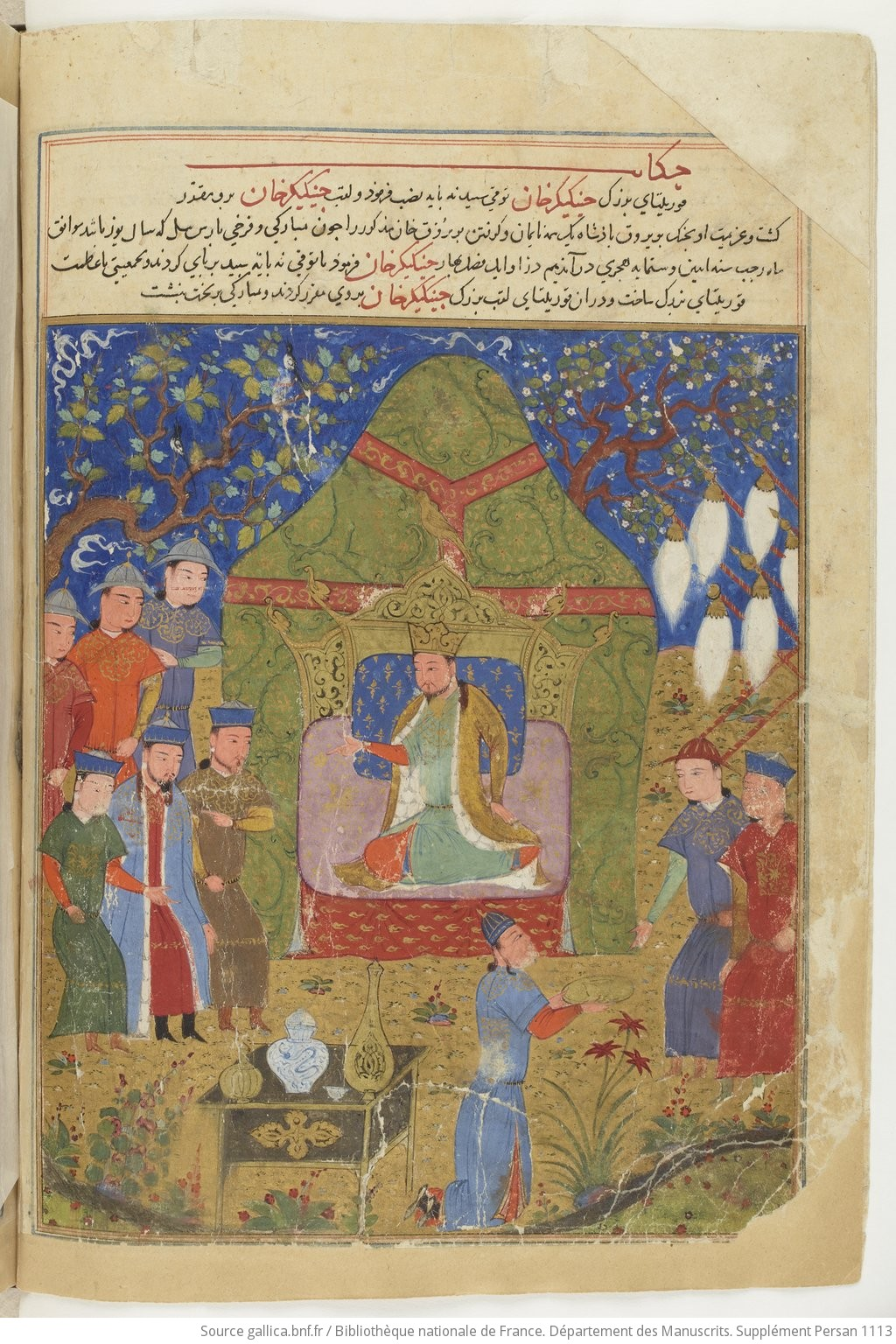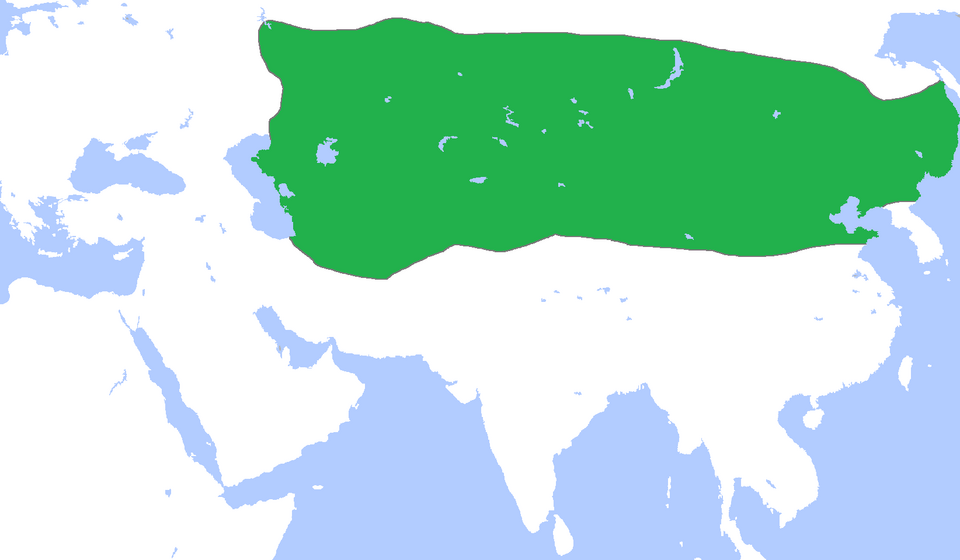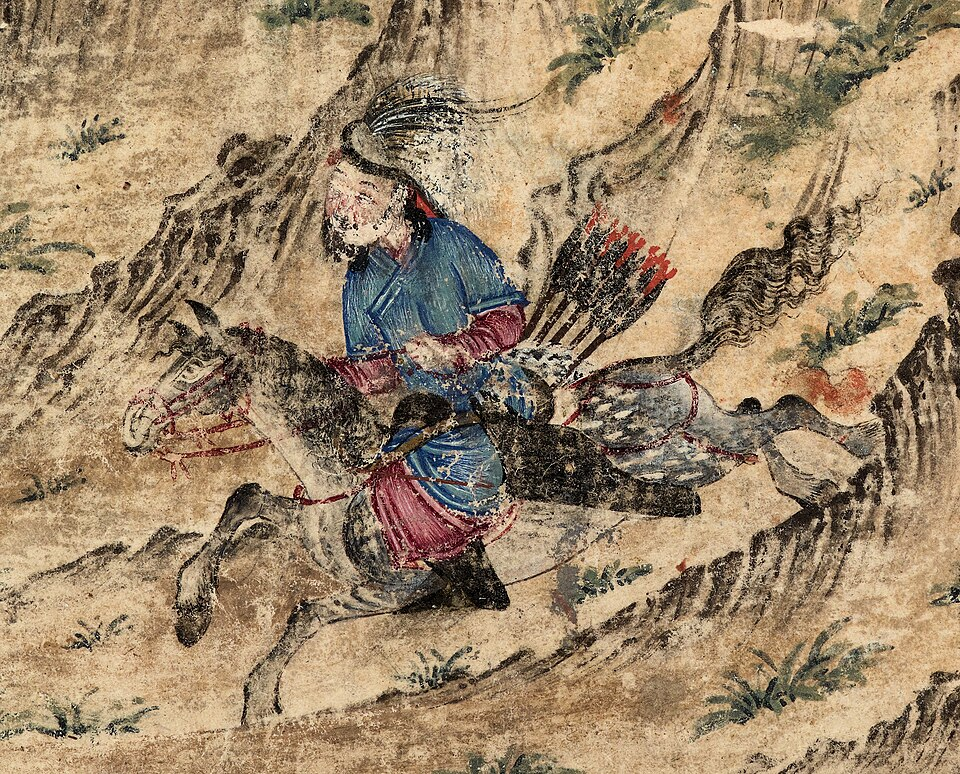IB Syllabus focus:
'Genghis Khan's leadership style, including his decision-making process, treatment of subordinates, and use of authority.
His overarching objectives for the expansion and governance of the Mongol Empire.
The extent to which these objectives were achieved during his lifetime, with specific examples of successes and failures.'
Genghis Khan, renowned as one of the most significant leaders in history, transformed the nomadic tribes of Mongolia into a formidable military power. This section delves deeper into his nuanced leadership style, strategic objectives, and the extent of their realisation.
Genghis Khan's Leadership Style
Decision-Making Process
Consultative Approach: Genghis Khan didn't rule in isolation. He often convened kurultais, traditional assemblies, where he sought advice and made major decisions with the consensus of his trusted advisers.

A 15th-century Jāmiʿ al-Tawārīkh miniature depicting the 1206 assembly at which Temüjin was acclaimed as Genghis Khan. The scene conveys the ceremonial and political authority of the kurultai, underscoring that major decisions were publicly legitimated. Source
Meritocratic Selection: In a departure from tribal traditions, Genghis Khan prioritised merit over lineage. He recognised and promoted individuals based on talent and accomplishments, ensuring decisions were grounded in expertise.
Treatment of Subordinates
Meritocratic Advancement: In the Mongol Empire, one's skills, loyalty, and contributions dictated their status, not their birth. Such a system encouraged fierce loyalty and determination among his troops.
Loyalty Rewarded: Genghis Khan was known to reward loyalty generously. For instance, Subutai, once a mere herder, rose to become the empire’s primary military strategist, largely due to his unwavering allegiance to Genghis Khan.
Use of Authority
Decisive Authority: Genghis Khan was not one for prolonged indecision. Quick, decisive actions were his forte, ensuring swift implementation of strategies.
Ruthlessness with Pragmatism: His reputation for savagery is well-documented, with tales of entire cities razed to instil fear. However, alongside this ruthlessness was a pragmatic streak. He often assimilated skilled individuals from conquered territories, enriching the Mongol Empire.
Overarching Objectives for Expansion and Governance
Expansion
Unify the Mongol Tribes: Fragmentation was the bane of the Mongol tribes. Genghis Khan's first and foremost objective was to bring these warring factions under a unified banner, creating a consolidated power base.
Forge a Vast Empire: With the Mongol tribes united, Genghis Khan looked outward. His vision was not just of conquest, but of creating an expansive empire stretching from Asia to Europe.
Governance
Centralised Administration: Managing such an expansive territory required a robust administrative framework. Genghis Khan worked towards a centralised administrative structure, streamlining governance processes across the empire.
Mongol Law (Yassa): To maintain order across diverse regions, he introduced the Yassa, a legal code. This comprehensive set of laws covered various facets, from criminal offences to civil matters, ensuring consistent governance.
Trade and Economy: Recognising the lifeline of an empire, Genghis Khan placed emphasis on securing and promoting trade routes. He ensured the safety of traders, fostering economic prosperity.
Achievements and Failures
Achievements
Unification of Mongol Tribes: Perhaps his most significant achievement, Genghis Khan, through a mix of military strategy and diplomacy, succeeded in unifying the Mongol tribes. This not only amplified the military might but also created a cohesive Mongol identity.
Empire Expansion: Under his leadership, the Mongol Empire grew at an unprecedented rate. Regions such as Central Asia, the Middle East, and much of China were brought under Mongol control. Notable campaigns include the conquest of the Western Xia and Jin Dynasties in China and the invasion of the Khwarezm Empire.

A clean, high-resolution map of the Mongol Empire circa 1227, at the time of Genghis Khan’s death. It highlights the core territories unified during his reign, providing a concise visual measure of his strategic objectives achieved by 1227. Source
Administrative Innovations: Genghis Khan's introduction of the Yassa, combined with other administrative reforms, played a crucial role in governing vast territories. He also established a postal system, known as the Yam, which enhanced communication across the empire.

An early-14th-century miniature of a rider in the Mongol Yam (relay) system, the communication backbone that supported centralised administration and the protection of trade. While an artistic depiction rather than a schematic diagram, it faithfully illustrates the state courier in motion. Source
Failures
Khwarezm Campaign Challenges: While the Khwarezm Empire was eventually conquered, the campaign faced numerous hurdles. The most glaring was the Shah of Khwarezm's treacherous act of killing Genghis Khan's trade envoy, leading to a full-scale invasion as retaliation.
Incomplete Conquest of China: The Song Dynasty of southern China remained a challenge. Although Genghis Khan made significant inroads, the complete subjugation of the Song Dynasty was left to his successors, most notably Kublai Khan.
In conclusion, Genghis Khan's leadership was a potent mix of military genius, strategic foresight, and administrative acumen. His leadership qualities not only facilitated the creation of a vast empire but also laid the foundational structures that would ensure its longevity and prosperity.
FAQ
The Yassa was a legal code introduced by Genghis Khan to ensure consistent governance across the vast territories of the Mongol Empire. Comprising a series of laws and edicts, the Yassa touched upon various facets of daily life, from criminal offences to civil matters, and even some aspects of morality. It represented Genghis Khan's vision for a unified legal system that would bind the empire's diverse populace under a common set of regulations. The Yassa's significance lies in its role in centralising authority, promoting social order, and creating a sense of Mongol identity, making governance more streamlined and effective across the expansive and diverse territories.
Genghis Khan utilised a mix of rewards and punishments to ensure loyalty among his subordinates. On the one hand, he was known to reward loyalty generously, offering positions of power, wealth, and prestige to those who proved their dedication. His meritocratic system ensured that even those from humble backgrounds could rise to prominent positions if they demonstrated competence and unwavering allegiance. On the other hand, Genghis Khan was also known for his ruthlessness in dealing with treachery. Betrayal was met with swift and often severe punishment, acting as a deterrent and reinforcing the importance of loyalty to the empire and its leader.
Genghis Khan's leadership set a precedent and provided a blueprint for subsequent Mongol leaders. His emphasis on meritocracy over lineage persisted, ensuring the empire continued to benefit from the skills of its most competent individuals. The Yassa, which Genghis Khan introduced, remained a cornerstone of Mongol law and governance. His strategies of expansion, particularly the emphasis on swift military campaigns followed by pragmatic governance, were emulated by successors like Kublai Khan. Moreover, Genghis Khan's policy of religious tolerance, which fostered unity in a diverse empire, became an enduring facet of Mongol leadership. His legacy wasn't just in the territories he conquered but in the leadership ideals he instilled, which influenced Mongol rule for generations.
Genghis Khan's governance strategies, including the introduction of the Yassa, meritocratic administration, and emphasis on trade, were pivotal in ensuring the empire's longevity. By introducing a unified legal system, he instilled a sense of common identity among the diverse populations, ensuring cohesiveness. The meritocratic approach meant that competent individuals governed the empire, leading to efficient administration. Furthermore, by promoting and securing trade routes, he ensured the economic prosperity of the empire. This combination of robust administrative reforms, a thriving economy, and a unified legal and cultural framework created a strong foundation, allowing the Mongol Empire to thrive and sustain long after Genghis Khan's demise.
Genghis Khan's leadership was markedly different from traditional Mongol chieftains in various aspects. While Mongol chieftains typically relied heavily on tribal affiliations and bloodlines to ascertain loyalty and assign roles, Genghis Khan shifted towards a meritocratic system. This meant roles and responsibilities were delegated based on competence and loyalty, not just lineage. Additionally, while many chieftains were constrained by tribal customs and often ruled through consensus, Genghis Khan wielded centralized authority, allowing him to make swift and resolute decisions. His forward-thinking strategies, like ensuring safety for traders and promoting cultural exchanges, were also not common practices among his predecessors.
Practice Questions
Genghis Khan's meritocratic approach was revolutionary, particularly in an era where lineage and tribal affiliations often dictated positions of power. By recognising and rewarding individuals based on their abilities and loyalty, rather than their birthright, he fostered a culture of competence and dedication. This had profound implications for the Mongol Empire: administratively, it ensured that the empire was governed by capable individuals, leading to efficient and effective governance. Militarily, it meant that the Mongol armies were led by the most competent strategists and fighters, irrespective of their tribal backgrounds. This strategy significantly contributed to the rapid expansion and sustainable governance of the vast Mongol territories.
Promoting and securing trade routes was a masterstroke of Genghis Khan's strategic foresight. Recognising that the economic prosperity of an empire is intrinsically linked to its trade, he took measures to ensure the safety and security of traders. This had multifaceted significance. Economically, it facilitated the flow of wealth into the Mongol Empire, enhancing its prosperity. Culturally, these trade routes, most notably the Silk Road, became conduits for cultural exchange, bringing in new ideas, technologies, and knowledge. Furthermore, by ensuring the safety of traders, Genghis Khan projected an image of a stable and secure empire, which in turn attracted more traders, creating a virtuous cycle of economic growth and cultural enrichment.

